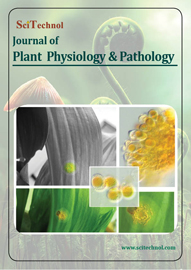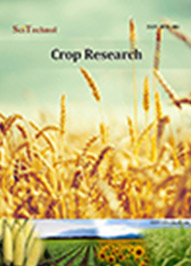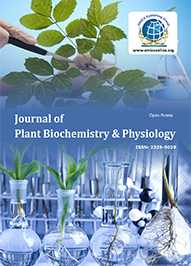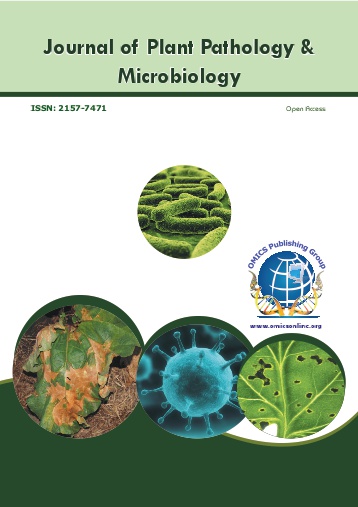Theme: Transforming future of Plant Science
Plant Science 2016
Conference Series LLC invites all the participants from all over the world to attend “Second Global Summit on Plant Science” during October 06-08, 2016 at London, UK which includes prompt keynote presentations, Oral talks, Poster presentations Young Research Forum and Exhibitions.
Plant Science 2016 is the premier event that brings together a unique and international mix of experts, researchers and decision makers both from academia and industry across the globe to exchange their knowledge, expertise and research innovations to build a world class plant Science conference.
It’s our greatest pleasure to welcome you to the official website of 2nd Global Summit on Plant Science that aims at bringing together the Professors, Researchers, scientists, Program developers to provide an international forum for the dissemination of original research results, new ideas and practical development experiences which concentrate on both theory and practices. The conference will be held in October 06-08, 2016 at London, UK. The theme of the conference is around, “Transforming future of Plant Science”.150+ attendees from all over the world
The event focuses on aspects such as plant science research aspects and plant biochemistry, molecular marker development, crop/ trait improvement, disease resistance, epigenetics, evolution studies and pathology as well understanding tools to overcome barrier and enable successful data analysis and management. Presentations concentrate not only particular to Plant Science but also crop and forestry research ranging from wheat, barley, maize and rice to potato, tomato, Arabidopsis, biofuels.
Why to attend???
With members from around the world focused on learning about Plant Science and its advances; this is your best opportunity to reach the largest assemblage of participants from the Plant Science and Agriculture community. Conduct presentations, distribute information, meet with current and potential scientists, make a splash with new advancements and developments, and receive name recognition at this 3-day event. World-renowned speakers, the most recent techniques, developments, and the newest updates in Plant Science are hallmarks of this conference.
Target Audience:
- Plant Science / Agricultural Students, Scientists
- Plant Science Researchers
- Plant Science Faculty
- Agricultural Universities
- Horticulture and Landscaping
- Plant and Agriculture Associations and Societies
- Business Entrepreneurs
- Training Institutes
- Manufacturing Agricultural Devices Companies
- R&D Laboratories
Looking forward to meet you @Hilton London Heathrow Airport, London, UK
We invite you to join us in Crowne Plaza Heathrow, London to promote Plant Science event!!!!!
2nd Global Summit on Plant Science will be hosted by the ConferenceSeries Ltd during October 06-08, 2016 at London, UK.
Plant Science Conference is designed to bring together scientific researchers, laureates and professionals to discuss the development and progress of research in the area of Plant Science and Agriculture Science.
ConferenceSeries Ltd is dedicated to serve the scientific community through its 350 leading Open access peer reviewed Journals supported by 30,000 renowned editorial board and more than 3 million readers worldwide. ConferenceSeries Ltd is proud to host around 450 International Conferences around the globe to address the current issues and discoveries in the field of Plant sciences, Biotechnology, Agriculture Science. ConferenceSeries Ltd scientific events are the special designed cluster of program that provides a common platform where industry meets academia to discuss the recent issues and happening.
Session/ Track Follows
Track 1: Plant Tissue Culture and Plant Biotechnology
Plant tissue culture is the growth of plant cells outside an intact plant. It depends on maintaining plant cells in aseptic conditions on a suitable nutrient medium. The culture can be sustained as a mass of undifferentiated cells for an extended period of time, or regenerated into whole plants. The different techniques used in plant tissue culture: Plant Cell Growth | Plant Biotechnology event | Crops and Plant Breeding
Plant tissue culture is widely used to produce clones of a plant in a method known as micro-propagation. Plant Biotechnology is the technology which is used for getting new product with high yield and at faster ways. Plant Bio technology is emerging in the field of medicine interfacing Plant Biotechnology and bioinformatics; the molecular characterization of medicinal plants; molecular farming; and leads from chemistry, nanotechnology, pharmacology, agriculture, Biomass and biofuels as well.
The global market for commercial biotechnology separation systems reached nearly $16 billion in 2012 and is expected to reach $17.1 billion by the end of 2013. The market is expected to grow at a compound annual growth rate (CAGR) of 10.1%, reaching a value of $27.8 billion by 2018.
Plant Science Conferences | Plant Biology Conferences | Plant Biology Meetings | ConferenceSeries Ltd
Relevant Conferences:
5th International Conference on Agriculture and Horticulture June 27-29, 2016 Cape Town, South Africa ; 6th International Conference on Plant Genomics July 14-15, 2016 Brisbane, Australia; International Conference on Green Energy & Expo September 21-23, 2015 Orlando, FL, USA; International Plant Breeding Congress and EUCARPIA-Oil and Protein Crops Conference November 01-05 Antalya ,Turkey; International Conference on Breeding and Genetics June 24 – 26, 2015 Wroclaw, Poland; 11th International Congress of Plant Molecular Biology (IPMB) October 25 - 30, 2015 Foz do Iguazu, Brazil; Plant Genomics Congress September 14-15, 2015 St. Louis, USA; XVIth Meeting on Plant Breeding September 9-11, 2015 Wageningen, the Netherlands
Major Plant Science Societies around the Globe
Genetics Society of China , China; International Society of Plant Pathology; Indian Society of Plant Physiology; International Crop Science Society International Society for Horticultural Science;Irish Plant Scientists' Association Ireland; International Society for Plant Molecular Biology; Japanese Society for Plant Cell and Molecular Biology, Japan; Japanese Society of Plant Physiologists, Japan;
Track 2: Plant Genomics
Plant genomes are more complex than other eukaryotic genomes, and analysis reveals many evolutionary flips and turns of the DNA sequences over time. Plants show widely different chromosome numbers and varied ploidy levels. Overall, the size of plant genomes (both number of chromosomes and total nucleotide base-pairs) exhibits the greatest variation of any kingdom in the biological world.
The global market for ubiquitin proteasome research and development was estimated at nearly $2.9 billion in 2013. The market should total more than $5.5 billion by 2018, and have a five-year compound annual growth rate (CAGR) of 14.2% from 2013 to 2018.
Plant Science Conferences | Plant Biology Conferences | Plant Biology Meetings | ConferenceSeries Ltd | Plant Science Congres |
Relevant Conferences:
5th International Conference on Agriculture and Horticulture June 27-29, 2016 Cape Town, South Africa ; 6th International Conference on Plant Genomics July 14-15, 2016 Brisbane, Australia; International Conference on Green Energy & Expo September 21-23, 2015 Orlando, FL, USA; International Plant Breeding Congress and EUCARPIA-Oil and Protein Crops Conference November 01-05 Antalya ,Turkey; International Conference on Breeding and Genetics June 24 – 26, 2015 Wroclaw, Poland; 11th International Congress of Plant Molecular Biology (IPMB) October 25 - 30, 2015 Foz do Iguazu, Brazil; Plant Genomics Congress September 14-15, 2015 St. Louis, USA; XVIth Meeting on Plant Breeding September 9-11, 2015 Wageningen, the Netherlands
Major Plant science Societies around the Globe
American Society of Plant Biologists, USA; Australian Society of Plant Scientists, Australia;
Argentinean Society of Plant Physiology, Argentina; American Society of Agronomy, USA; UK Plant Sciences Federation, UK; Royal Horticultural Society, UK; British Society for Plant Pathology, UK;
Track 3: Plant Genetics and Epigenetics
Plant genetics play a key role in the modern-day theories of heredity. There are various modern techniques to develop genetically modify plants, genetically engineered crops. Epigenetics is the interchanging between the heredity and the environment through molecular mechanisms (DNA methylation, gene silencing, fluorescent in situ hybridization.
The global single nucleotide polymorphism (SNP) genotyping market was valued at $3.5 billion in 2013. This market is expected to reach $4.3 billion in 2014 and $11.5 billion in 2019, a compound annual growth rate (CAGR) of 21.9% from 2014 to 2019.
Plant Science Conferences | Plant Biology Conferences | Plant Biology Meetings | ConferenceSeries Ltd
Relevant Conferences:
5th International Conference on Agriculture and Horticulture June 27-29, 2016 Cape Town, South Africa ; 6th International Conference on Plant Genomics July 14-15, 2016 Brisbane, Australia; International Conference on Green Energy & Expo September 21-23, 2015 Orlando, FL, USA; International Plant Breeding Congress and EUCARPIA-Oil and Protein Crops Conference November 01-05 Antalya ,Turkey; International Conference on Breeding and Genetics June 24 – 26, 2015 Wroclaw, Poland; 11th International Congress of Plant Molecular Biology (IPMB) October 25 - 30, 2015 Foz do Iguazu, Brazil; Plant Genomics Congress September 14-15, 2015 St. Louis, USA; XVIth Meeting on Plant Breeding September 9-11, 2015 Wageningen, the Netherlands
Major Plant Science Societies around the Globe
American Society of Plant Biologists, USA; Australian Society of Plant Scientists, Australia; Argentinean Society of Plant Physiology, Argentina; American Society of Agronomy, USA;
Royal Horticultural Society, UK; British Society for Plant Pathology, UK; African Crop Science Society Africa; Brazilian Society of Plant Physiology Brazil; Botanical Society of China, China;
Track 4: Plant Breeding and Molecular Breeding
Plant breeding is the techniques which are used for molecular biology to select, or in the case of genetic modification, to insert desirable traits into plants. Molecular breeding such as marker assisted selection and doubled haploids are highly useful techniques. There is possibility that through plant breeding can also utilized by organic cultivation.
The global market for ubiquitin proteasome research and development was estimated at nearly $2.9 billion in 2013. The market should total more than $5.5 billion by 2018, and have a five-year compound annual growth rate (CAGR) of 14.2% from 2013 to 2018.
Plant Science Conferences | Plant Biology Conferences | Plant Biology Meetings | ConferenceSeries Ltd
Relevant Conferences:
5th International Conference on Agriculture and Horticulture June 27-29, 2016 Cape Town, South Africa ; 6th International Conference on Plant Genomics July 14-15, 2016 Brisbane, Australia; International Conference on Green Energy & Expo September 21-23, 2015 Orlando, FL, USA; International Plant Breeding Congress and EUCARPIA-Oil and Protein Crops Conference November 01-05 Antalya ,Turkey; International Conference on Breeding and Genetics June 24 – 26, 2015 Wroclaw, Poland; 11th International Congress of Plant Molecular Biology (IPMB) October 25 - 30, 2015 Foz do Iguazu, Brazil; Plant Genomics Congress September 14-15, 2015 St. Louis, USA; XVIth Meeting on Plant Breeding September 9-11, 2015 Wageningen, the Netherlands
Major Plant Science Societies around the Globe
American Society of Plant Biologists, USA; Australian Society of Plant Scientists, Australia; Argentinean Society of Plant Physiology, Argentina; American Society of Agronomy, USA; UK Plant Sciences Federation, UK; Royal Horticultural Society, UK; British Society for Plant Pathology, UK;
Track 5: Plant Pathology and Weed Science
Plant pathology is the scientific study of diseases in plants caused by pathogens and environmental conditions. Organisms that cause infectious disease include fungi, bacteria, viruses, viroid, virus-like organisms, Phytoplasma, protozoa, nematodes and parasitic plants. A plant considered undesirable, unattractive, or troublesome, especially one that grows where it is not wanted and often grows or spreads fast or takes the place of desired plants. It is an aquatic plant or alga, especially seaweed
BCC Research projects that the global bio pesticide and synthetic pesticide market will grow from $54.8 billion in 2013 to nearly $61.8 billion by 2014 and to $83.7 billion by 2019 at a five-year compound annual growth rate (CAGR) of 6.3%, from 2014 through 2019.
Plant Science Conferences | Plant Biology Conferences | Plant Biology Meetings | ConferenceSeries Ltd
Relevant Conferences:
5th International Conference on Agriculture and Horticulture June 27-29, 2016 Cape Town, South Africa ; 6th International Conference on Plant Genomics July 14-15, 2016 Brisbane, Australia; International Conference on Green Energy & Expo September 21-23, 2015 Orlando, FL, USA; International Plant Breeding Congress and EUCARPIA-Oil and Protein Crops Conference November 01-05 Antalya ,Turkey; International Conference on Breeding and Genetics June 24 – 26, 2015 Wroclaw, Poland; 11th International Congress of Plant Molecular Biology (IPMB) October 25 - 30, 2015 Foz do Iguazu, Brazil; Plant Genomics Congress September 14-15, 2015 St. Louis, USA; XVIth Meeting on Plant Breeding September 9-11, 2015 Wageningen, the Netherlands
Major Plant science Societies around the Globe
American Society of Plant Biologists, USA; Australian Society of Plant Scientists, Australia; Argentinean Society of Plant Physiology, Argentina; American Society of Agronomy, USA;
Track 6: Nanotechnology in Plant Science
The complex and different responses of plants to nanoparticles, the signal transduction mechanisms involved, and the regulation of DNA expression. Further, it shows the photosynthesis of nanoparticles, the role of nanoparticles in the antioxidant systems of botany and agriculture, the beneficial and harmful effects of nanoparticles on plants, and the application of nanoparticles and nanotubes to ms, aiming ultimately at an analysis of the metabolomics of plants.
The increasing role of inventions in the field of nanotechnology is producing novel applications in the fields of biotechnology and agriculture. Nanoparticles have received much response because of the unique physico-chemical properties of these compounds. In the plant biology, nanoparticles are used as “smart” delivery systems, prompting the Nobel Prize winner P. Ehrlich support to get these components as “magic bullets.” Nanotechnology also play an important role in agriculture as compound fertilizers and minute-pesticides, acting as chemical delivery agents that target molecules to specific cellular organelles in plants.
Relevant Conferences:
5th International Conference on Agriculture and Horticulture June 27-29, 2016 Cape Town, South Africa ; 6th International Conference on Plant Genomics July 14-15, 2016 Brisbane, Australia; International Conference on Green Energy & Expo September 21-23, 2015 Orlando, FL, USA; International Plant Breeding Congress and EUCARPIA-Oil and Protein Crops Conference November 01-05 Antalya ,Turkey; International Conference on Breeding and Genetics June 24 – 26, 2015 Wroclaw, Poland; 11th International Congress of Plant Molecular Biology (IPMB) October 25 - 30, 2015 Foz do Iguazu, Brazil; Plant Genomics Congress September 14-15, 2015 St. Louis, USA; XVIth Meeting on Plant Breeding September 9-11, 2015 Wageningen, the Netherlands
Major Plant science Societies around the Globe
American Society of Plant Biologists, USA; Australian Society of Plant Scientists, Australia; Argentinean Society of Plant Physiology, Argentina; American Society of Agronomy, USA; Royal Horticultural Society, UK; British Society for Plant Pathology, UK; African Crop Science Society Africa; Brazilian Society of Plant Physiology Brazil; Botanical Society of China, China;
Track 7: Medicinal and Aromatic Plants
Many of the herbs and spices used by humans to season food also yield useful medicinal compounds. All plants produce chemical compounds as part of their normal metabolic activities such as phytochemistry. The use of herbs to treat disease is almost universal. Many herbs have shown positive results in-vitro while studies on some herbal treatments have found positive results.
This report provides an analysis of the emerging botanical drug industry and markets, geographically and by therapeutic area. The future of plant-derived drugs as a whole is discussed along with the traditional medicine
The global botanical and plant-derived drug market was valued at $21.4 billion in 2011 and should reach $22.1 billion in 2012. Total market value is expected to reach $26.6 billion in 2017 after increasing at a five-year compound annual growth rate (CAGR) of 3.7%.
Plant Science Conferences | Plant Biology Conferences | Plant Biology Meetings | ConferenceSeries Ltd
Relevant Conferences:
5th International Conference on Agriculture and Horticulture June 27-29, 2016 Cape Town, South Africa ; 6th International Conference on Plant Genomics July 14-15, 2016 Brisbane, Australia; International Conference on Green Energy & Expo September 21-23, 2015 Orlando, FL, USA; International Plant Breeding Congress and EUCARPIA-Oil and Protein Crops Conference November 01-05 Antalya ,Turkey; International Conference on Breeding and Genetics June 24 – 26, 2015 Wroclaw, Poland; 11th International Congress of Plant Molecular Biology (IPMB) October 25 - 30, 2015 Foz do Iguazu, Brazil; Plant Genomics Congress September 14-15, 2015 St. Louis, USA; XVIth Meeting on Plant Breeding September 9-11, 2015 Wageningen, the Netherlands
Major Plant Science Societies around the Globe
American Society of Plant Biologists, USA; Australian Society of Plant Scientists, Australia; Argentinean Society of Plant Physiology, Argentina; American Society of Agronomy, USA;
Track 8: Plant Physiology and Biochemistry
The Study of plant functioning, growth, metabolism and reproduction in living plants and also concerned with the plant morphology and some basic process such as photosynthesis, respiration, plant nutrition, plant hormone functions, tropisms, nastic movements, environmental stress physiology (plant diseases),photo -morphogenesis, seed germination, dormancy and stomata function and transpiration, both parts of plant water relations.
Plant biochemistry is related to molecular biology such as macromolecules and plant metabolisms, Biomolecules, carbohydrates, proteins, lipids.
The global market for metabolomics was valued at $712 million in 2012 and is expect to reach nearly $1.4 billion in 2017, after increasing at a five-year compound annual growth rate (CAGR) of 14.2%.
Plant Science Conferences | Plant Biology Conferences | Plant Biology Meetings | ConferenceSeries Ltd
Relevant Conferences:
5th International Conference on Agriculture and Horticulture June 27-29, 2016 Cape Town, South Africa ; 6th International Conference on Plant Genomics July 14-15, 2016 Brisbane, Australia; International Conference on Green Energy & Expo September 21-23, 2015 Orlando, FL, USA; International Plant Breeding Congress and EUCARPIA-Oil and Protein Crops Section Conference November 01-05 Antalya ,Turkey; International Conference on Rye Breeding and Genetics June 24 – 26, 2015 Wroclaw, Poland; 11th International Congress of Plant Molecular Biology (IPMB) October 25 - 30, 2015 Foz do Iguazu, Brazil; Plant Genomics Congress September 14-15, 2015 St. Louis, USA; XVIth Meeting of the EUCARPIA Section Biometrics in Plant Breeding September 9-11, 2015 Wageningen, the Netherlands
Major Plant Science Societies around the Globe
American Society of Plant Biologists, USA; Australian Society of Plant Scientists, Australia; Argentinean Society of Plant Physiology, Argentina; American Society of Agronomy, USA; Royal Horticultural Society, UK; British Society for Plant Pathology, UK; African Crop Science Society Africa; Brazilian Society of Plant Physiology Brazil; Botanical Society of China, China;
Track 9: Plant Morphology and Metabolism
Plant morphology deals with both the vegetative structures of plants, as well as the reproductive structures. It includes plant development, floral morphology pollination and fertilization. Plant morphology provides an overview of the science of studying the external form of plants. Plant metabolism includes the complex of physical and chemical events of photosynthesis, respiration, and the synthesis of organic compounds
The global market for ubiquitin proteasome research and development was estimated at nearly $2.9 billion in 2013. The market should total more than $5.5 billion by 2018, and have a five-year compound annual growth rate (CAGR) of 14.2% from 2013 to 2018.
Plant Science Conferences | Plant Biology Conferences | Plant Biology Meetings | ConferenceSeries Ltd
Relevant Conferences:
5th International Conference on Agriculture and Horticulture June 27-29, 2016 Cape Town, South Africa ; 6th International Conference on Plant Genomics July 14-15, 2016 Brisbane, Australia; International Conference on Green Energy & Expo September 21-23, 2015 Orlando, FL, USA; International Plant Breeding Congress and EUCARPIA-Oil and Protein Crops Conference November 01-05 Antalya ,Turkey; International Conference on Breeding and Genetics June 24 – 26, 2015 Wroclaw, Poland; 11th International Congress of Plant Molecular Biology (IPMB) October 25 - 30, 2015 Foz do Iguazu, Brazil; Plant Genomics Congress September 14-15, 2015 St. Louis, USA; XVIth Meeting on Plant Breeding September 9-11, 2015 Wageningen, the Netherlands
Major Plant science Societies around the Globe
American Society of Plant Biologists, USA; Australian Society of Plant Scientists, Australia; Argentinean Society of Plant Physiology, Argentina; American Society of Agronomy, USA; UK Plant Sciences Federation, UK; Royal Horticultural Society, UK; British Society for Plant Pathology, UK;
Track 10: Soil science and soil-plant nutrition
The plants require water and minerals come from the soil, while carbon dioxide comes from the air. Macronutrients and Micronutrients are the essential elements required by plants. Soil quality is a major determinant of plant distribution and growth. Nitrogen is often the mineral that has the greatest effect on plant growth. Plants require nitrogen as a component of proteins, nucleic acids, chlorophyll. Biological nitrogen fixation (BNF) occurs when atmospheric nitrogen is converted to ammonia by an enzyme called nitrogenase. Soil science is the study of soil as a natural resource on the surface of the Earth including soil formation, classification and mapping and soil erosion.
The global agrochemical market was valued at $197.9 billion in 2014. This market is expected to reach nearly $207.9 billion in 2015 and $257.5 billion in 2019, after increasing at a compound annual growth rate (CAGR) of 5.4% from 2014 to 2019.
Plant Science Conferences | Plant Biology Conferences | Plant Biology Meetings | ConferenceSeries Ltd
Relevant Conferences:
5th International Conference on Agriculture and Horticulture June 27-29, 2016 Cape Town, South Africa ; 6th International Conference on Plant Genomics July 14-15, 2016 Brisbane, Australia; International Conference on Green Energy & Expo September 21-23, 2015 Orlando, FL, USA; International Plant Breeding Congress and EUCARPIA-Oil and Protein Crops Conference November 01-05 Antalya ,Turkey; International Conference on Breeding and Genetics June 24 – 26, 2015 Wroclaw, Poland; 11th International Congress of Plant Molecular Biology (IPMB) October 25 - 30, 2015 Foz do Iguazu, Brazil; Plant Genomics Congress September 14-15, 2015 St. Louis, USA; XVIth Meeting on Plant Breeding September 9-11, 2015 Wageningen, the Netherlands
Major Plant Science Societies around the Globe
Genetics Society of China , China; International Society of Plant Pathology; Indian Society of Plant Physiology; International Crop Science Society International Society for Horticultural Science;Irish Plant Scientists' Association Ireland; International Society for Plant Molecular Biology; Japanese Society for Plant Cell and Molecular Biology, Japan; Japanese Society of Plant Physiologists, Japan;
Track 11: Agricultural Science
Agricultural biology deals with the advances in genetics, physiology, biochemistry, biophysics, and molecular biology. Agriculture concerns techniques, including the. application of agronomic research. Agricultural biotechnology is a specific area of agricultural science involving the use of scientific tools and techniques, including genetic engineering, molecular markers, molecular diagnostics, vaccines, and tissue culture, to modify living organisms: plants, animals, and microorganisms Agriculture is the cultivation of animals, plants, fungi and other life forms for food, fiber, and other products used to sustain life. Agriculture was the key implement in the rise of sedentary human civilization, whereby farming of domesticated species created food surpluses that nurtured the development of civilization.
The study of agriculture is known as agricultural science. The history of agriculture dates back thousands of years, and its development has been driven and defined by greatly different climates, cultures, and technologies. However, all farming generally relies on techniques to expand and maintain the lands suitable for raising domesticated species. For plants, this usually requires some form of irrigation, although there are methods of dryland farming; pastoral herding on rangeland is still the most common means of raising livestock. In the developed world, industrial agriculture based on large-scale monoculture has become the dominant system of modern farming, although there is growing support for sustainable agriculture.
The global market for agricultural biotechnology reached $26.4 billion in 2013 and $27.8 billion in 2014. This indicatannual growth rate (CAGR) of 11.0% over the next five yeaion is expected to reach $46.8 billion in 2019, registering compounds.
Plant Science Conferences | Plant Biology Conferences | Plant Biology Meetings | ConferenceSeries Ltd
Relevant Conferences:
5th International Conference on Agriculture and Horticulture June 27-29, 2016 Cape Town, South Africa ; 6th International Conference on Plant Genomics July 14-15, 2016 Brisbane, Australia; International Conference on Green Energy & Expo September 21-23, 2015 Orlando, FL, USA; International Plant Breeding Congress and EUCARPIA-Oil and Protein Crops Conference November 01-05 Antalya ,Turkey; International Conference on Breeding and Genetics June 24 – 26, 2015 Wroclaw, Poland; 11th International Congress of Plant Molecular Biology (IPMB) October 25 - 30, 2015 Foz do Iguazu, Brazil; Plant Genomics Congress September 14-15, 2015 St. Louis, USA; XVIth Meeting on Plant Breeding September 9-11, 2015 Wageningen, the Netherlands
Major Plant science Societies around the Globe
Crop Science Society of America (CSSA), USA; Crop Science Society of China (CSSC), China; Federation of European Societies of Plant Biology (FESPB), Europe; Genetics Society of China , China; International Society of Plant Pathology; Indian Society of Plant Physiology; International Crop Science Society International Society for Horticultural Science;Irish Plant Scientists' Association Ireland; International Society for Plant Molecular Biology; Japanese Society for Plant Cell and Molecular Biology, Japan; Japanese Society of Plant Physiologists, Japan
Track 12: Plant Ecology and Diversity
Plant ecology is a study of the distribution and abundance of plants, the effects of environmental factors upon the abundance of plants, and the interactions among and between plants and other organisms. Plant ecology can also be divided by levels of organization including plant population ecology, community ecology, ecosystem ecology, landscape ecology and biosphere ecology. Plants are believed to have evolved from green algae called charophyceans. The kingdom Plantae contains embryophytes (plants with embryos).
The global sludge treatment and odor control equipment market is estimated to have been worth $6.5 billion in 2013, and is forecast to reach nearly $6.9 billion by year-end 2014. The compound annual growth rate (CAGR) during the forecast period, 2014 to 2019, is estimated to be 5.9%. At this rate, the market value will reach $9.2 billion by 2019.
Plant Science Conferences | Plant Biology Conferences | Plant Biology Meetings | ConferenceSeries Ltd
Relevant Conference
5th International Conference on Agriculture and Horticulture June 27-29, 2016 Cape Town, South Africa ; 6th International Conference on Plant Genomics July 14-15, 2016 Brisbane, Australia; International Conference on Green Energy & Expo September 21-23, 2015 Orlando, FL, USA; International Plant Breeding Congress and EUCARPIA-Oil and Protein Crops Conference November 01-05 Antalya ,Turkey; International Conference on Breeding and Genetics June 24 – 26, 2015 Wroclaw, Poland; 11th International Congress of Plant Molecular Biology (IPMB) October 25 - 30, 2015 Foz do Iguazu, Brazil; Plant Genomics Congress September 14-15, 2015 St. Louis, USA; XVIth Meeting on Plant Breeding September 9-11, 2015 Wageningen, the Netherlands
Major Plant Science Societies around the Globe
Crop Science Society of America (CSSA), USA; Crop Science Society of China (CSSC), China; Federation of European Societies of Plant Biology (FESPB), Europe; Genetics Society of China , China; International Society of Plant Pathology; Indian Society of Plant Physiology; International Crop Science Society International Society for Horticultural Science;Irish Plant Scientists' Association Ireland; International Society for Plant Molecular Biology; Japanese Society for Plant Cell and Molecular Biology, Japan; Japanese Society of Plant Physiologists, Japan
Track 13: Horticulture and Landscaping
Horticulture deals with the art, science, technology, and business of plant cultivation. It includes the cultivation of medicinal plant, fruits, vegetables, nuts, seeds, herbs, sprouts, mushrooms, algae, flowers, seaweeds and non-food crops such as grass and ornamental trees and plants organic cultivation. It also includes plant conservation, landscape restoration, landscape and garden design, construction, and maintenance, and arboriculture.
The global sludge treatment and odor control equipment market is estimated to have been worth $6.5 billion in 2013, and is forecast to reach nearly $6.9 billion by year-end 2014. The compound annual growth rate (CAGR) during the forecast period, 2014 to 2019, is estimated to be 5.9%. At this rate, the market value will reach $9.2 billion by 2019.
Plant Science Conferences | Plant Biology Conferences | Plant Biology Meetings | ConferenceSeries Ltd
Relevant Conferences:
5th International Conference on Agriculture and Horticulture June 27-29, 2016 Cape Town, South Africa ; 6th International Conference on Plant Genomics July 14-15, 2016 Brisbane, Australia; International Conference on Green Energy & Expo September 21-23, 2015 Orlando, FL, USA; International Plant Breeding Congress and EUCARPIA-Oil and Protein Crops Conference November 01-05 Antalya ,Turkey; International Conference on Breeding and Genetics June 24 – 26, 2015 Wroclaw, Poland; 11th International Congress of Plant Molecular Biology (IPMB) October 25 - 30, 2015 Foz do Iguazu, Brazil; Plant Genomics Congress September 14-15, 2015 St. Louis, USA; XVIth Meeting on Plant Breeding September 9-11, 2015 Wageningen, the Netherlands
Major Plant science Societies around the Globe
Crop Science Society of America (CSSA), USA; Crop Science Society of China (CSSC), China; Federation of European Societies of Plant Biology (FESPB), Europe; Genetics Society of China , China; International Society of Plant Pathology; Indian Society of Plant Physiology; International Crop Science Society International Society for Horticultural Science;Irish Plant Scientists' Association Ireland; International Society for Plant Molecular Biology; Japanese Society for Plant Cell and Molecular Biology, Japan; Japanese Society of Plant Physiologists, Japan
Track 14: Plant Environmental Sciences
Environmental science is the study of the effects of natural and unnatural processes, and of interactions of the physical components of the planet on the environment
Plant Science Conferences | Plant Biology Conferences | Plant Biology Meetings | ConferenceSeries Ltd
Relevant Conferences:
5th International Conference on Agriculture and Horticulture June 27-29, 2016 Cape Town, South Africa ; 6th International Conference on Plant Genomics July 14-15, 2016 Brisbane, Australia; International Conference on Green Energy & Expo September 21-23, 2015 Orlando, FL, USA; International Plant Breeding Congress and EUCARPIA-Oil and Protein Crops Conference November 01-05 Antalya ,Turkey; International Conference on Breeding and Genetics June 24 – 26, 2015 Wroclaw, Poland; 11th International Congress of Plant Molecular Biology (IPMB) October 25 - 30, 2015 Foz do Iguazu, Brazil; Plant Genomics Congress September 14-15, 2015 St. Louis, USA; XVIth Meeting on Plant Breeding September 9-11, 2015 Wageningen, the Netherlands
Major Plant science Societies around the Globe
American Society of Plant Biologists, USA; Australian Society of Plant Scientists, Australia; Argentinean Society of Plant Physiology, Argentina; American Society of Agronomy, USA;
Royal Horticultural Society, UK; British Society for Plant Pathology, UK; African Crop Science Society Africa; Brazilian Society of Plant Physiology Brazil; Botanical Society of China, China;
Track 15: Seed Science
Seeds are fundamental to agriculture. They are the starting point for the production of most crops and delivery system for advanced genetics. Seeds constitute 70% of our food and recent additional uses of seeds as stored energy has increased both seed and commodity prices worldwide. Seed science is the study of the structure and development of seeds from the moment of fertilization of the egg cell on the maternal plant until formation of a new plant from the seed. Seed science is divided into two sections carpology, studies the seeds and fruits of wild plants, and the other section studies the seeds of cultivated plants.
Plant Science Conferences | Plant Biology Conferences | Plant Biology Meetings | ConferenceSeries Ltd
Relevant Conferences:
5th International Conference on Agriculture and Horticulture June 27-29, 2016 Cape Town, South Africa ; 6th International Conference on Plant Genomics July 14-15, 2016 Brisbane, Australia; International Conference on Green Energy & Expo September 21-23, 2015 Orlando, FL, USA; International Plant Breeding Congress and EUCARPIA-Oil and Protein Crops Conference November 01-05 Antalya ,Turkey; International Conference on Breeding and Genetics June 24 – 26, 2015 Wroclaw, Poland; 11th International Congress of Plant Molecular Biology (IPMB) October 25 - 30, 2015 Foz do Iguazu, Brazil; Plant Genomics Congress September 14-15, 2015 St. Louis, USA; XVIth Meeting on Plant Breeding September 9-11, 2015 Wageningen, the Netherlands
Major Plant science Societies around the Globe
American Society of Plant Biologists, USA; Australian Society of Plant Scientists, Australia; Argentinean Society of Plant Physiology, Argentina; American Society of Agronomy, USA; UK Plant Sciences Federation, UK; Royal Horticultural Society, UK; British Society for Plant Pathology, UK;
Track 16: Plant Synthetic Biology
Synthetic biology is an approach to engineering science. The stabilization of element, from screw threads to printed circuit boards, drives both the speed of innovation and the economy of production in mechanical and electronic engineering. This conceptual model is the basis of synthetic biology, where the principles of engineering are applied to biological systems. Synthetic biology is not what we are making; Developing tools and methods for the precise modification of plant genomes and establishing a standard structure for collection of plant genes.
Plant Science Conferences | Plant Biology Conferences | Plant Biology Meetings | ConferenceSeries Ltd
Relevant Conferences:
5th International Conference on Agriculture and Horticulture June 27-29, 2016 Cape Town, South Africa ; 6th International Conference on Plant Genomics July 14-15, 2016 Brisbane, Australia; International Conference on Green Energy & Expo September 21-23, 2015 Orlando, FL, USA; International Plant Breeding Congress and EUCARPIA-Oil and Protein Crops Conference November 01-05 Antalya ,Turkey; International Conference on Breeding and Genetics June 24 – 26, 2015 Wroclaw, Poland; 11th International Congress of Plant Molecular Biology (IPMB) October 25 - 30, 2015 Foz do Iguazu, Brazil; Plant Genomics Congress September 14-15, 2015 St. Louis, USA; XVIth Meeting on Plant Breeding September 9-11, 2015 Wageningen, the Netherlands
Major Plant Science Societies around the Globe
Genetics Society of China , China; International Society of Plant Pathology; Indian Society of Plant Physiology, India; International Crop Science Society International Society for Horticultural Science ; Irish Plant Scientists' Association Ireland; International Society for Plant Molecular Biology; Japanese Society for Plant Cell and Molecular Biology, Japan; Japanese Society of Plant Physiologists, Japan;
Track 17: Plant Science and Natural Products
Plant-derived (Botanical) Ingredients were among the very first cosmetics. Natural colorants, plant juices for soothing and protection from insect pests, and fragrant oils for imparting scent were all used in ancient times. Historically, plants were the only way to produce products for cleaning, moisturizing, covering up blemishes and even treating minor skin conditions.
Natural products are prepared by organic synthesis, and have played a central role to the development of the field of organic chemistry by providing tremendously challenging targets and problems for synthetic strategy and tactics. Alkaloids are produced by a large variety of organisms, including bacteria, fungi, plants, and animals, and are part of the group of all natural and organic cosmetics.
Plant Science Conferences | Plant Biology Conferences | Plant Biology Meetings | ConferenceSeries Ltd
Relevant Conferences:
5th International Conference on Agriculture and Horticulture June 27-29, 2016 Cape Town, South Africa ; 6th International Conference on Plant Genomics July 14-15, 2016 Brisbane, Australia; International Conference on Green Energy & Expo September 21-23, 2015 Orlando, FL, USA; International Plant Breeding Congress and EUCARPIA-Oil and Protein Crops Conference November 01-05 Antalya ,Turkey; International Conference on Breeding and Genetics June 24 – 26, 2015 Wroclaw, Poland; 11th International Congress of Plant Molecular Biology (IPMB) October 25 - 30, 2015 Foz do Iguazu, Brazil; Plant Genomics Congress September 14-15, 2015 St. Louis, USA; XVIth Meeting on Plant Breeding September 9-11, 2015 Wageningen, the Netherlands
Major Plant Science Societies around the Globe
Crop Science Society of China , China; Federation of European Societies of Plant Biology, Europe; China, China; International Society of Plant Pathology, USA:Indian Society of Plant Physiology, Germany; International Crop Science Society; USA; International Society for Horticultural Science, Belgium; Irish Plant Scientists' Association Ireland
Track 18: Plant Biodiversity and conservation
Humankind has affected our planet in many ways. In the past few centuries the changes in society and the "Biodiversity" is the full complexity and variety of life, at all scales, from genetic diversity, up to species and even ecosystem diversity. So, we use the term "biodiversity conservation" to refer to attempts to conserve and any parts of this natural diversity. Plant diversity is a major plant of total biodiversity - just think of the richness of tropical rain forests -.it forms the basis of all food webs, and underpins the functioning of all ecosystems. So, plant conservation is an essential component of efforts for biodiversity conservation. As plants are at risk of extinction, in all parts of the world, their conservation is a priority.
Plants are relevant and vital to all of us and we should all be aware that plants across the world are endangered with many facing extinction, and support efforts that tackle this problem. Plant diversity is especially important because it underpins the functioning of all ecosystems, as well as providing us with many direct benefits.
Plant Science Conferences | Plant Biology Conferences | Plant Biology Meetings | ConferenceSeries Ltd
Relevant Conferences:
5th International Conference on Agriculture and Horticulture June 27-29, 2016 Cape Town, South Africa ; 6th International Conference on Plant Genomics July 14-15, 2016 Brisbane, Australia; International Conference on Green Energy & Expo September 21-23, 2015 Orlando, FL, USA; International Plant Breeding Congress and EUCARPIA-Oil and Protein Crops Conference November 01-05 Antalya ,Turkey; International Conference on Breeding and Genetics June 24 – 26, 2015 Wroclaw, Poland; 11th International Congress of Plant Molecular Biology (IPMB) October 25 - 30, 2015 Foz do Iguazu, Brazil; Plant Genomics Congress September 14-15, 2015 St. Louis, USA; XVIth Meeting on Plant Breeding September 9-11, 2015 Wageningen, the Netherlands
Major Plant science Societies around the Globe
American Society of Plant Biologists, USA; Australian Society of Plant Scientists, Australia; Argentinean Society of Plant Physiology, Argentina; American Society of Agronomy, USA; Royal Horticultural Society, UK; British Society for Plant Pathology, UK; African Crop Science Society Africa; Brazilian Society of Plant Physiology Brazil; Botanical Society of China, China;
Track 19: Plant/Agriculture - Industrial Byproducts Entrepreneurs Investment B2B
A key ingredient in successful entrepreneurship is self-knowledge. (Plant Science and Agri science) aims to bring together all existing and budding bio entrepreneurs to share experiences and present new innovations and challenges in microbiological community. Each year, over a million companies are started in the world with about 5–10 of them classified as high technology companies. Turning ideas into business ventures is tricky and the opportunity-recognition step is critical in new venture creation.
This gestalt in the entrepreneur's perception of the relationship between the invention and final product is refined into a business model that describes how the venture will make money or provide an appropriate return to the potential investors. Biological science is complex and rapidly changing and requires a specialized knowledge to understand the value of the innovation and its competitive position in the industry.
Plant Science Conferences | Plant Biology Conferences | Plant Biology Meetings | ConferenceSeries Ltd
Relevant Conferences:
5th International Conference on Agriculture and Horticulture June 27-29, 2016 Cape Town, South Africa ; 6th International Conference on Plant Genomics July 14-15, 2016 Brisbane, Australia; International Conference on Green Energy & Expo September 21-23, 2015 Orlando, FL, USA; International Plant Breeding Congress and EUCARPIA-Oil and Protein Crops Conference November 01-05 Antalya ,Turkey; International Conference on Breeding and Genetics June 24 – 26, 2015 Wroclaw, Poland; 11th International Congress of Plant Molecular Biology (IPMB) October 25 - 30, 2015 Foz do Iguazu, Brazil; Plant Genomics Congress September 14-15, 2015 St. Louis, USA; XVIth Meeting on Plant Breeding September 9-11, 2015 Wageningen, the Netherlands
Plant Science Societies
Crop Science Society of America, USA; Crop Science Society of China , China;Federation of European Societies of Plant Biology , Europe; Genetics Society of China, China; International Society of Plant Pathology Indian Society of Plant Physiology International Crop Science Society
2nd Global Summit on Plant Science during October 06-08, 2016 in London, UK
The theme of the conference is around, “Transforming future of Plant Science”
Importance and scope
Plant Science is a mounting and constantly evolving field of study, one which has gained much ground in past years through the development of advanced research and data management tools. Expert researchers explore the current issues and methodologies of this expanding field, specifically addressing areas of gene discovery and the functional analysis of genes with a target on the primary tools and sub-disciplines of genetic mapping, mRNA, protein and metabolite profiling. Plant Science employ exciting new methods to investigate molecular plant physiology and Bio-technology and gene functional analysis via transformation, mutation, protein function, and gene expression. The success of transgenic crops has erased the last vestiges of doubt about the value of agricultural biotechnology and triggered large-scale investments in plant Science.
Plant Science has roots in agriculture and Plant Science also has scope in agriculture fields, medicine, food production and textiles. It is the main source of food for human being. As well as we can get plant proteins, phytochemicals from plants, from medicinal plants some medicines are prepared and which can cure some fatal diseases. Form some recent study it is proved that plant antioxidant helps us to protect from free radical damage. By using Phytochemicals some cancer cell proliferation can be prevented at earlier stage. Beside that we can increase the nutrition value of plant by plant biotechnology and plant breeding. Now days green energy are used as non-conventional source of energy to reduce environmental pollution. So in human life Plant Science and plant oriented studies are very much important to sustain in this planet.
Value of Plant Science to Agriculture and Society
Plant Science will accelerate the application of Biotechnology to Agriculture. By accelerating the application of Bio-technology, Tissue Culture techniques significantly increases the value of seeds and agricultural products. This increase adds much wealth to the customers, company owners, employees, and citizens of the nations in which genetic supply companies operate, and to both producing and importing nations whose food costs consequently are decreased.
While the message is not new, the declaration of the flaws of the US biomedical research system by four prominent life scientists this spring captured everyone’s attention. Rather than devote money to faculty salaries, universities built infrastructure to house more self-paid researchers able to bring in more money via research grants, of which a large fraction was used as revenue (overhead) for the university. More labs required more students to fill them, leading to a dramatic rise of PhDs in the biomedical sciences, which then produced more researchers competing for dwindling grant dollars. In short, research institutions have no incentive to support individual faculty and instead have perverse incentives to encourage further research spending: more grants = more overhead = more buildings = more PIs = more PhDs in an increasingly out-of-control spiral. (See “PhDs in the U.S,UK.”) This is not sustainable, and we are now experiencing the consequences, with the most despairing being the lack of adequate jobs for our postdocs and perceived insufficient funding for all of us.
PhDs in the U.S and UK: From 1982 to 2012, the total number of PhDs in the life sciences (blue) has grown dramatically. Most of these PhDs are in biological, biomedical, and health sciences (red), however; the number of PhDs in the agricultural and natural sciences (green) has remained flat over that same time period. The unsustainable rate of PhDs awarded per year in the biomedical sciences does not extrapolate to the rate of PhDs in other life sciences, however, especially the agricultural sciences, where the rate of PhDs per year has remained flat for decades. Since 1982, we have consistently trained only about 1,000 PhDs in applied agricultural and related sciences each year. And over the last decade, the U.S. has annually produced only 800 or so plant scientists working in applied agricultural science and only 100 with the skills for basic plant research. (See “Plant science stagnates.”) Given the global agricultural challenges we now face, this is a problem.
The Earth must support another 1 billion humans in the coming decade, and must do so with less arable land and in an unpredictable climate. This means we must find innovative ways to produce crops with higher yields and novel traits—a feat that will require the work of PhDs trained in agriculture and plant sciences, Royal Botanical Garden. But at this point we are not producing enough plant scientists to lead us out of this Malthusian dilemma.
Why London?
It is a major centre of higher education teaching and research and its 43 universities form the largest concentration of higher education in Europe. London contains four World Heritage Sites: the Tower of London; Kew Gardens; the site comprising the Palace of Westminster, Westminster Abbey, and St Margaret’s Church; and the historic settlement of Greenwich. Other famous landmarks include Buckingham Palace, the London Eye, Piccadilly Circus, St Paul’s Cathedral, Tower Bridge, Trafalgar Square, and The Shard. London is home to numerous museums, galleries, libraries, sporting events and other cultural institutions, including the British Museum, National Gallery, Tate Modern, British Library and 40 West End theatres. So the Aquaculture-2016 in going to be held in United Kingdom
London is the capital city of England and the United Kingdom. It is the most populous region, urban zone and metropolitan area in the United Kingdom. Standing on the River Thames, London has been a major settlement for two millennia, its history going back to its founding by the Romans, who named it Londinium. London is a leading global city, with strengths in the arts, commerce, education, entertainment, fashion, finance, healthcare, media, professional services, research and development, tourism and transport all contributing to its prominence. It is one of the world’s leading financial centers and has the fifth-or sixth-largest metropolitan area GDP in the world depending on measurement. London is a world cultural capital. It is the world’s most-visited city as measured by international arrivals and has the world’s largest city airport system measured by passenger traffic. London’s 43 universities form the largest concentration of higher education in Europe. In 2012, London became the first city to host the modern Summer Olympic Games three times. London has a diverse range of peoples and cultures, and more than 300 languages are spoken within its boundaries.
Why to attend???
The significance of plants in human life is significant. Plants and plant products are essential for us. Food, energy, medicine and so many things we are able to get from plants. This conference seek to bring all such scientist, Noble Laureate, researcher, research scholar, students and people together who are involved in this field and provide them to discuss about their innovation, exchange ideas and interaction with each other.
Major Plant science Associations around the Globe
American Society of Plant Biologists (ASPB)
Australian Society of Plant Scientists (ASPS)
Argentinean Society of Plant Physiology (SAFV)
American Society of Agronomy (ASA)
UK Plant Sciences Federation (UKPSF)
Royal Horticultural Society, UK
British Society for Plant Pathology, UK
African Crop Science Society (ACSS)
Brazilian Society of Plant Physiology (SBFV)
Botanical Society of China (BSC)
Canadian Society of Plant Biologists (CSPB)
Chile’s National Network of Plant Biologists (CNNPB)
Chinese Society of Plant Biology (CSPB)
Crop Science Society of America (CSSA)
Crop Science Society of China (CSSC)
European Association for Research on Plant Breeding (EUCARPIA)
European Plant Science Organization (EPSO)
Federation of European Societies of Plant Biology (FESPB)
Genetics Society of China (GSC)
International Society of Plant Pathology (ISPP)
Indian Society of Plant Physiology (ISPP)
International Crop Science Society (ICSS)
International Society for Horticultural Science (ISHS)
Irish Plant Scientists' Association (IPSA)
International Society for Plant Molecular Biology (ISPMB)
Japanese Society for Plant Cell and Molecular Biology (JSPCMB)
Japanese Society of Plant Physiologists (JSPP)
Korean Society of Plant Biologists (KSPB)
New Zealand Society of Plant Biologists (NZSPB)
The Crop Protection Association, UK
Grassland Society of NSW, Australia
Aerial Agricultural Association of Australia, Australia
Australian Native Plant Society, Australia
AgForce, Australia
Agribusiness Association of Australia, Australia
AusBiotech, Australia
Australasian Plant Pathology Society, Australia
Australian Association of Agricultural Consultants, Australia
Australian Certified Organic, Australia
Australian Pest Controllers, Australia
Australian Society of Soil Science, Australia
Target Audience:
The target audience will be Plant Biologist, Microbiologist, plant physiologist, agriculturalist, plant genomics specialist, plant pathologist, Molecular and cell biologist researcher or scientist who are researching in molecular biology and using medicinal plant products
Meet Your Target Market With members from around the world focused on learning about Plant Biology, this is your single best opportunity to reach the largest assemblage of participants from the all Over the World. Conduct demonstrations, distribute information, meet with current, make a splash with a new product line, and receive name recognition at this 3-day event. World-renowned speakers, the most recent techniques, tactics, and the newest updates in Plant Science are hallmarks of this conference.
A Unique Opportunity for Advertisers and Sponsors at this International event:
The global market for plant science is expected to reach USD 22.1 billion by 2020, growing at an estimated CAGR of 10.3% from 2014 to 2020, according to a new study by Grand View Research, Inc. Plant Science play an imperative role in the field of GM testing by enabling the use of fast and effective result rendering genetically modified crops. This coupled with growing prevalence of infectious diseases and tissue culture is expected to drive market growth during the forecast period. Other driving factors for this market include decreasing prices of tissue culture, increasing demand for GM plant, extensive presence of both private and public external funding programs and growing patient awareness levels. In addition, presence of untapped growth opportunities in emerging countries such as India, Brazil and China and the increasing horticulture & Landscaping, Botanical awareness are expected to serve this market as future growth opportunities.
Plant Science based products dominated the overall market in terms of revenue at 36.4% in 2013 majorly owing to the presence of a relatively larger in University of Marylander of R&D programs. Plant Science based medicinal product segment on the other hand is expected to grow at the fastest CAGR of over 12.0% from 2014 to 2020 due to increasing demand for population based therapeutic solutions and subsequent increase in R&D initiatives.
Market Size - $11.1 Billion in 2013, Market Growth - CAGR of 10.3% from 2014 to 2020, Market Trends - Growing demand for GM crops and the consequent rise in demand for Plant Biology based R&D initiatives is expected to drive market growth during the forecast period. Plant derived products, Bio Pesticides, Plant Biotechnology Products.
Conference Highlights
- Plant Physiology and Biochemistry
- Plant Tissue Culture and Plant Biotechnology
- Agricultural Science
- Plant Pathology and Plant-Microbe Biology
- Medicinal and Aromatic Plant Sciences
- Plant Morphology and Plant Metabolism
- Plant Breeding and Molecular Breeding
- Soil science and soil-plant nutrition
- Plant & Forest Ecology and its Diversity
- Horticulture, Landscaping and Forest Science
- Plant Genomics
- Plant Genetics and epigenetics
- Nanotechnology and Plant Sciences
- Plant/Agriculture - Industrial Byproducts Entrepreneurs Investment B2B
- Plant Synthetic Biology and Plant Transcriptome
- Seed Science and Technology
- Plant Environmental Sciences and Forest ecosystems
- Plant Science and Natural Products
- Plant Biodiversity and conservation, Tree ecosystem
- Plant Root and Tree Root System
- Post Harvest Technology of Agriculture- Oilseeds & Pulses
- Pharmacognosy and ethnopharmacology
To share your views and research, please click here to register for the Conference.
To Collaborate Scientific Professionals around the World
| Conference Date | October 06-08, 2016 | ||
| Sponsors & Exhibitors |
|
||
| Speaker Opportunity Closed | Day 1 | Day 2 | Day 3 |
| Poster Opportunity Closed | Click Here to View | ||
Useful Links
Special Issues
All accepted abstracts will be published in respective Our International Journals.
Abstracts will be provided with Digital Object Identifier by























